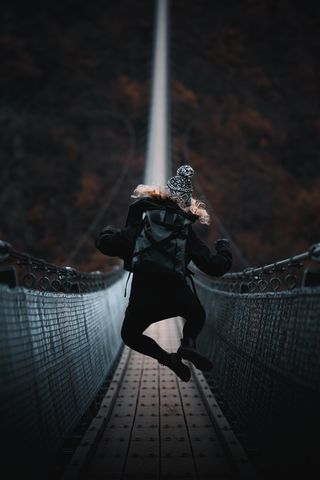Creativity
A Novel Finding: Improv and the Great Unknown
First study to show causal link between improvisation and uncertainty tolerance.
Posted February 5, 2020 Reviewed by Kaja Perina

There’s a lot of anecdotal evidence that improvisation helps people deal better with uncertainty, but Peter Felsman, Sanuri Gunawardena, and Colleen M. Seifert have just published the findings from the first study to ever show a causal link between improvisation and uncertainty tolerance.
It makes sense that improvising would help people deal with the unknown. I mean, you jump up on stage without a script and make things up with people. You don’t know how the scene will end. You don’t even know how it will start. It makes sense that practicing that skill over time might lead to a better relationship between you and uncertainty.
But the team’s findings are even more revealing.
The Studies
In the first of two studies, Felsman, Gunawardena, and Seifert randomly grouped participants into one of two groups. One group participated in twenty minutes of improv exercises and games. The other did twenty minutes of similar activities but without improvising. For example, in one activity the improv group pretended to see a made-up film and had to collaboratively describe it, while the other group individually described an actual film they had seen.
In the first study, both groups showed an increase in uncertainty tolerance—questionnaires showed that both groups were more comfortable with the unknown after participating in the twenty minutes of activities.
In the second study, Felsman, Gunawardena, and Seifert scripted all the non-improv exercises. Instead of talking about a film they had seen, participants read from a script about a film. This more closely mirrors some of Charles Limb’s fMRI studies with jazz musicians, rappers, and comedic improvisers. The second study measured improvised against scripted activities.
Findings
In the second study, the researchers found that after just twenty minutes of improv exercises, participants, once again, showed an increase in uncertainty tolerance. However, the participants in the scripted group did not.
This is important evidence for the benefits of improvisation. After only twenty minutes, participants showed an increase in uncertainty tolerance. Imagine how more rigorous improv training or instruction might impact uncertainty tolerance. After twenty minutes, improv also led to increases in divergent thinking and affective wellbeing.
The first study showed the most significant boost to divergent thinking, which Felsman attributes to the collaborative co-creation. The improv group made stuff up together, while the other group made stuff up (talked about a film they’d seen) alone. The collaborative nature of improv seemed to be the key to boosting creativity.
When the comparison group used scripts instead of self-generated material, improv led to relative gains in uncertainty tolerance. In short, you may have to feel uncertainty to tolerate it better.
Improv offers exactly that. It’s a safe, playful space where you know people will go along with your ideas and everyone’s idea will be heard. That’s the kind of unpredictability that makes people more comfortable with uncertainty and more likely to take risks and speak up. Now for the first time, we have causal evidence to prove it.
References
Felsman, P., Gunawardena, S., & Seifert, C. M. (2020). Improv Experience Promotes Divergent Thinking, Uncertainty Tolerance, and Affective Well-Being. Thinking Skills and Creativity, 100632.
Limb, C. J., & Braun, A. R. (2008). Neural substrates of spontaneous musical performance: An fMRI study of jazz improvisation. PLoS one, 3(2).
López-González, M., & Limb, C. J. (2012, January). Musical creativity and the brain. In Cerebrum: the dana forum on brain science (Vol. 2012). Dana Foundation.


